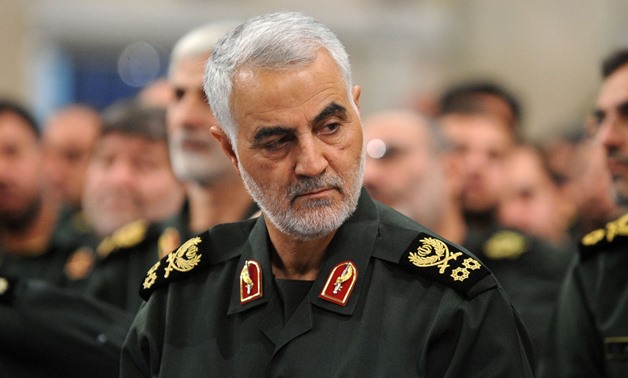
Photo: Press Office of Iranian Supreme Leader/Anadolu Agency/Getty Images
CAIRO – 4 January 2020: After the U.S. Pentagon confirmed on Friday it had launched an airstrike that killed top Iranian general Qassem Soleimani, observers of the international scene began worrying about the possibility of a US-Iran war.
The U.S. Pentagon said on Thursday that Soleimani was actively developing plans to attack Americans in Iraq and the Middle East.
"At the direction of the President, the U.S. military has taken decisive defensive action to protect U.S. personnel abroad by killing Qassem Soleimani," the Pentagon said in a statement.
Iraqi State television reported Soleimani's death in a breaking news alert, citing sources from the Hashed, which is dominated by Shiite-majority factions close to Tehran.
Security sources said the rockets left eight people dead, including "important figures."
"This strike was aimed at deterring future Iranian attack plans," it said, adding that the United States would continue to take necessary action to protect Americans and interests around the world.
The Pentagon said that Soleimani had "orchestrated" attacks on coalition bases in Iraq over the past few months and approved the "attacks" on the U.S. embassy in Baghdad this week.
One U.S. official said that Iraqi militia commander Abu Mahdi al-Muhandis was also believed to have been killed in the strike, according to initial information, though he was not the primary target.
Former U.S. ambassador to the United Nations Nikki Haley said that Soleimani's death "should be applauded by all who seek peace and justice."
Most analysts and observers say Suleimani’s killing will force Iran to retaliate for certain fundamental reasons including self-preservation, as the death of Suleimani posed a blow to Tehran’s functioning and military capabilities.
Some observers say Iran will have to retaliate to prevent the United States from killing its leaders again, however, they are not certain about how the revenge will be served.
Tehran might target U.S. key interests and objectives through a number of counterattacks that would be costly to the U.S. and its allies.
According to New York Times columnist Max Fisher, in a sense, both sides have already lost control: It’s not as if the United States wanted its Baghdad embassy stormed or Iran wanted its Quds Force commander killed.
Iran's supreme leader Ayatollah Ali Khamenei vowed "severe revenge" after the killing of Soleimani.
Mohsen Rezai, a former IRGC head, said on Friday that “revenge would be exacted on the United States for killing Soleimani.”
"Soleimani joined his martyr brothers but we will exact terrible vengeance upon America," Rezai, who currently heads the Expediency Council, wrote on Twitter.
The airport attack also killed Abu Mahdi al-Muhandis, the group's deputy chief.
Iran's foreign minister also slammed the killing of Soleimani as a “dangerous escalation” and further warned the United States would bear responsibility for the consequences.
"The US' act of international terrorism, targeting and assassinating General Soleimani... is extremely dangerous and a foolish escalation," Mohammad Javad Zarif wrote on Twitter.
"The US bears responsibility for all consequences of its rogue adventurism," he added.
Moreover, General Gholamali Abuhamzeh, the commander of the Guards in the southern province of Kerman, raised the prospect of possible attacks on ships in the Gulf.
Iran reserved the right to take revenge against the United States for the death of Soleimani, he said in comments made late on Friday and reported on Saturday by Tasnim.
“The Strait of Hormuz is a vital point for the West and a large number of American destroyers and warships cross there ... vital American targets in the region have been identified by Iran since long time ago ... some 35 U.S. targets in the region as well as Tel Aviv are within our reach,” he said.
Russia further warned on Friday that killing Soleimani would increase tensions across the Middle East.
"The killing of Soleimani... was an adventurist step that will increase tensions throughout the region," news agencies RIA Novosti and TASS quoted the foreign ministry as saying.
Moscow is also one of the world powers that negotiated the landmark Iran nuclear deal that Washington withdrew from in 2018, leading to a surge in tensions.
Konstantin Kosachev, the head of the foreign affairs committee of the Russian parliament's upper house, said on Facebook that “Retaliatory strikes will certainly follow.”
He pointed out that the killing marked the end of any chance to salvage the nuclear deal.
Moreover, leader of Lebanon's Tehran-backed Hezbollah group called Friday for the death in a US strike of top Iranian commander Major General Qasem Soleimani to be avenged.
"Meting out the appropriate punishment to these criminal assassins... will be the responsibility and task of all resistance fighters worldwide," Hassan Nasrallah said in a statement.
The assassination of the commander of the Quds Force, the elite expeditionary arm of Iran’s Revolutionary Guard, escalates the shadowy war between Tehran and Washington and its allies, David Gardner, an international affairs editor, said according to FT.
It will be difficult to prevent the cycle of reprisals and counter-attacks that will almost certainly ensue from sliding into direct confrontation — and with it the risk of all-out war.
The conflict will scatter more sparks across a region scarred by war and turmoil, and add a risk premium to international oil prices that jumped 3 per cent a barrel on the news.

Comments
Leave a Comment